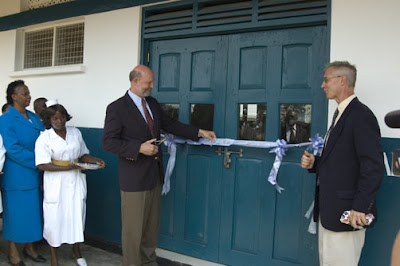It's late. About 10pm and the team has just finished cleaning up after a cultural discussion and a local meal (rice, g-nut sauce, beef and soupu, and sweet potatoes). There is plenty left over, more than we can store and eat the next day, but throwing good food out isn't really an option here. Pamela suggests we head to the health center and distribute the leftovers. Pamela, Karen and I hop in our white diesel chariot (really it’s a Toyota truck, but it's fun to think of it as a chariot) and rumble through Nyahuka trading center on our way to the clinic. Nyahuka is a scene on Saturday night at 10pm. Blazing stereos, harsh lights from motorcycle headlights, people wandering around and calling out at the vehicle. We quickly passed and made it to the health center.
The health center was a stark contrast to the town. There is an air of silence and sadness as we walked into the dark building. There were no lights other than the headlamps we were wearing. Dark faces darted in and out of shadows as we silently walked past those who had overflowed from the wards into the hallways. We made our way to the pediatric ward. Karen made an announcement and empty bowls, and cups quickly appeared inside the halo of light that surrounded us. In moments like these I forget all of my lubwisi words and I am left to spoon empathy and love silently into each dish amid soft "webale's" (thank you) from mothers and children. As my heart wells up with emotion I struggle with the reality and closeness of poverty. At the verge of tears I throw in the towel on trying to figure out the injustice of the world and focus on spooning one spoonful at a time into each bowl. I am left to take solace in pure faith that God is somehow glorified with small spoonfuls of rice and g-nuts and the small children in the pediatric ward.
 (This guy was so awesome...he could really shake it. He was a part of one of the drama groups that performed).
(This guy was so awesome...he could really shake it. He was a part of one of the drama groups that performed). (This guy was so awesome...he could really shake it. He was a part of one of the drama groups that performed).
(This guy was so awesome...he could really shake it. He was a part of one of the drama groups that performed). (This is the old Pediatric Ward)
(This is the old Pediatric Ward)  (And this is the new one. Look at the shine on the tile!)
(And this is the new one. Look at the shine on the tile!)






